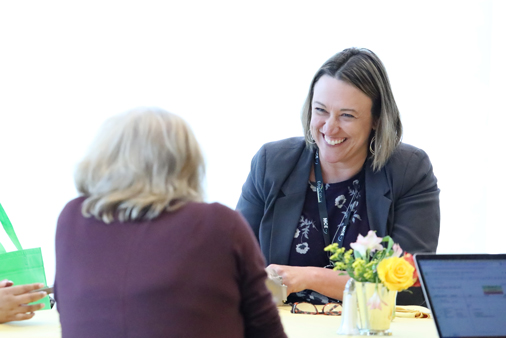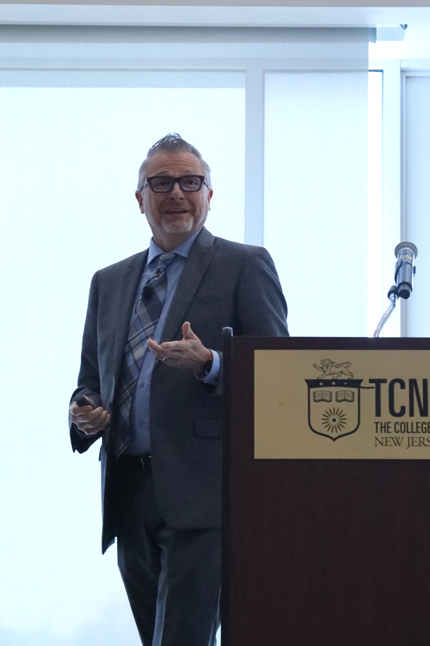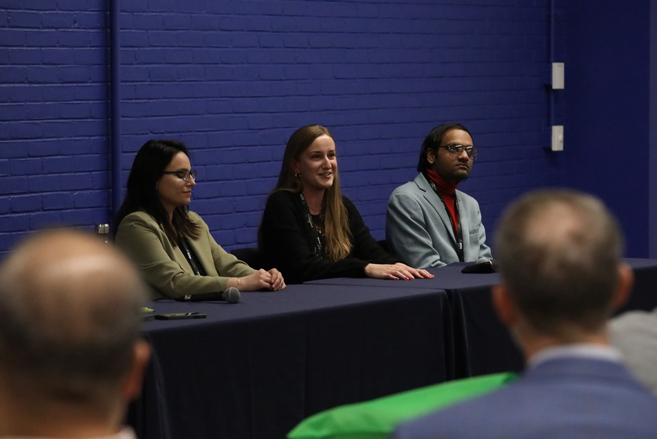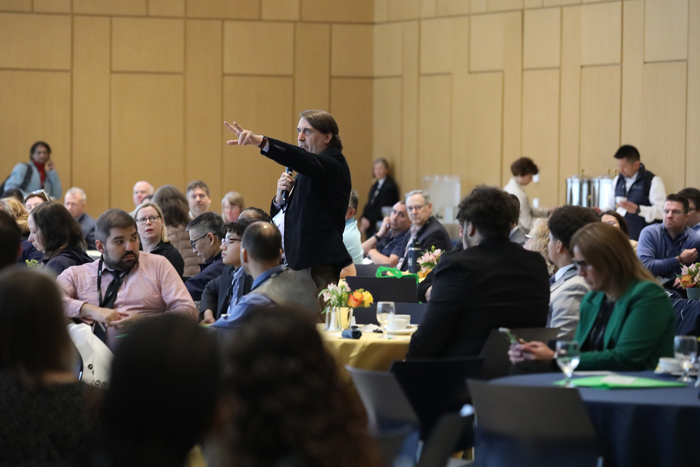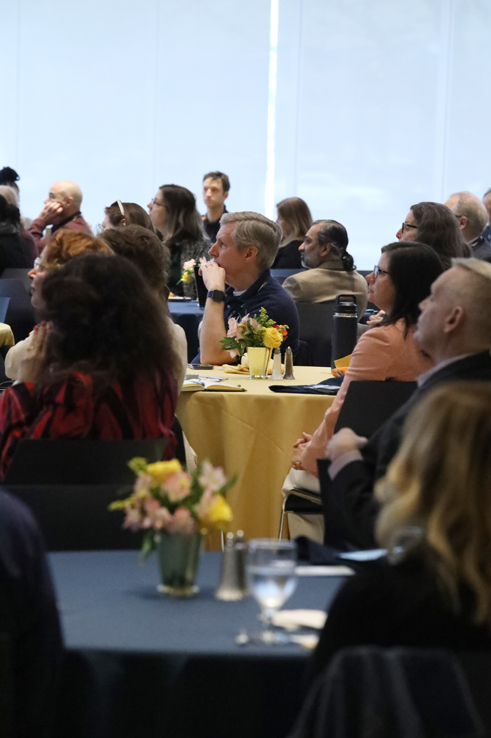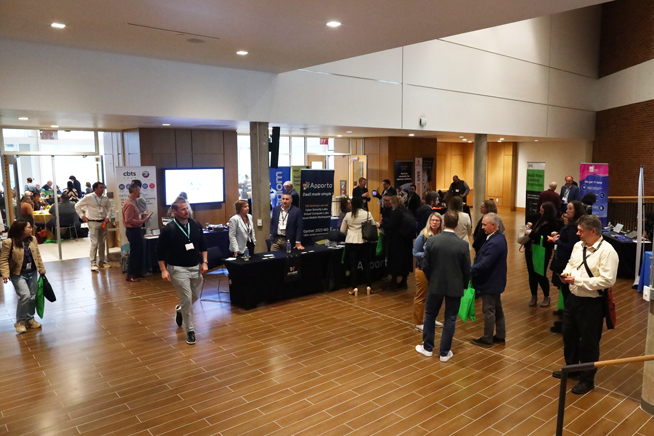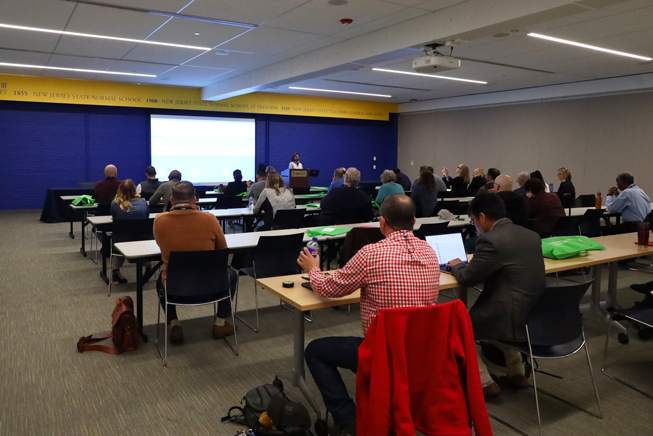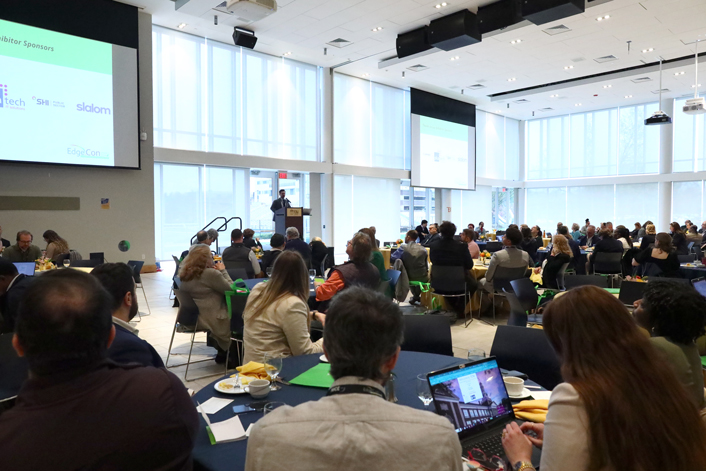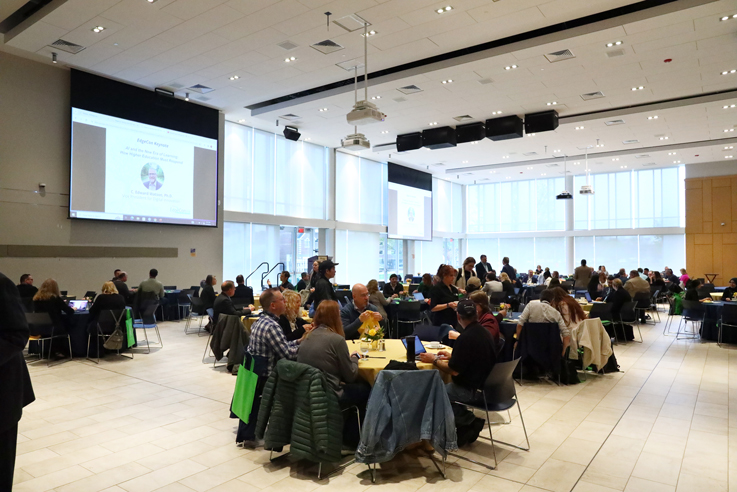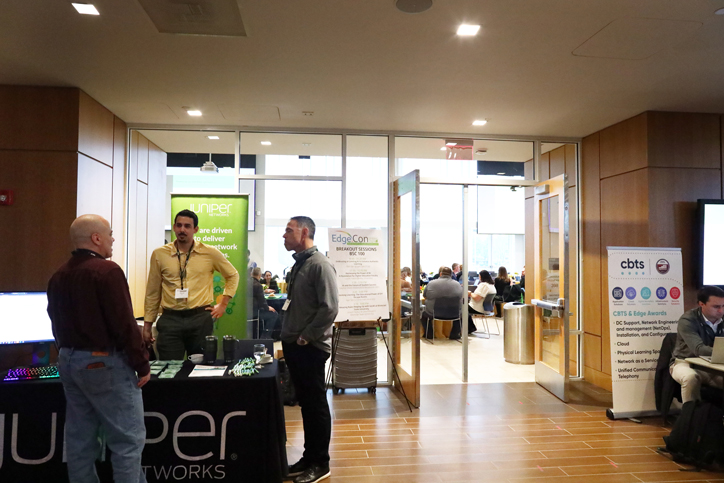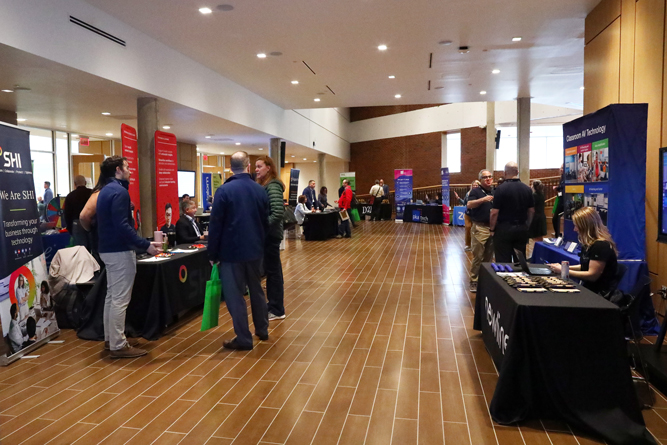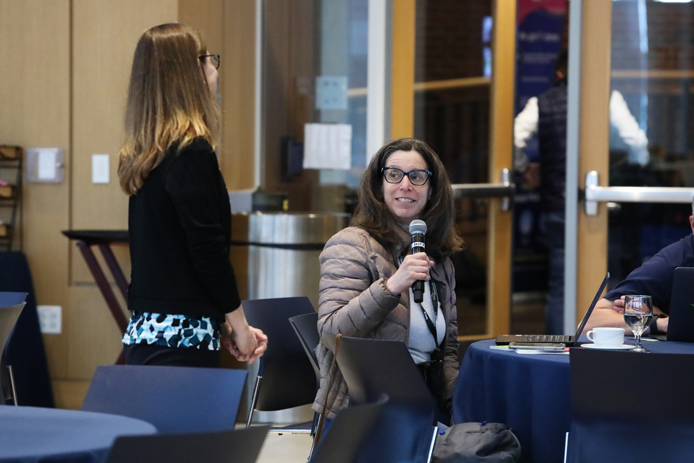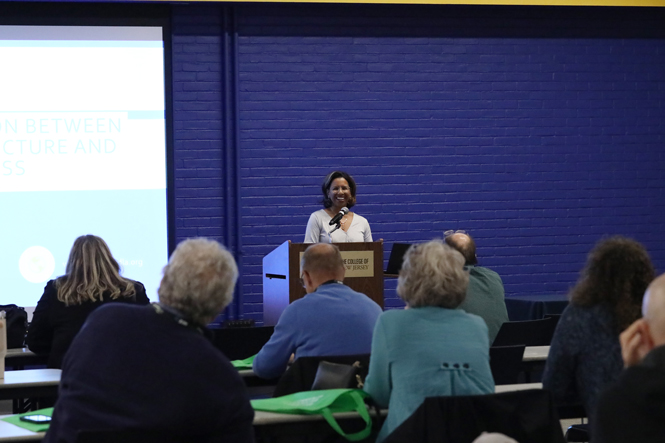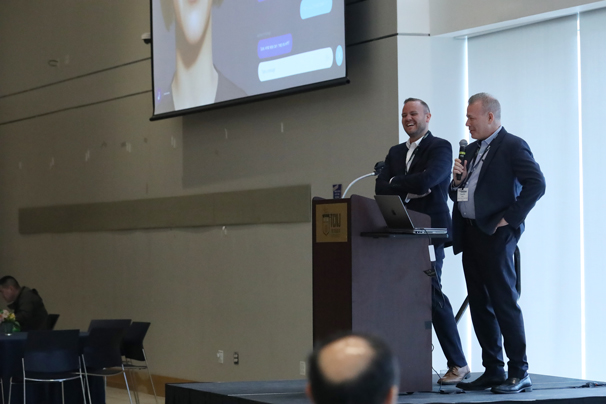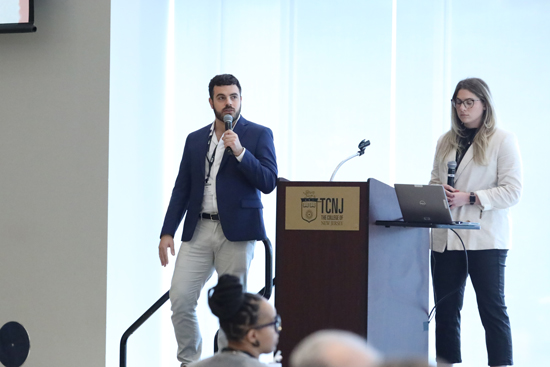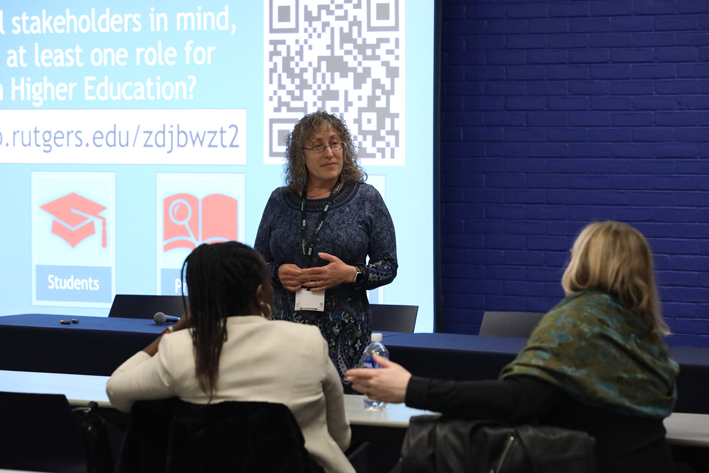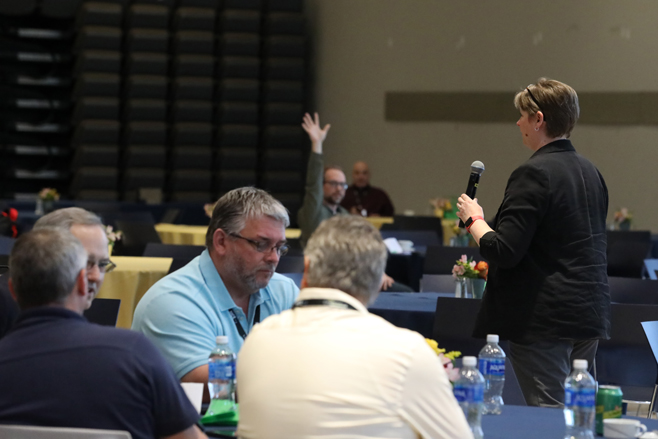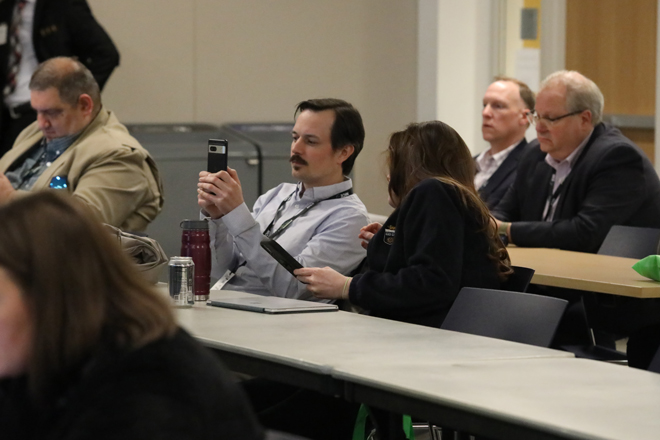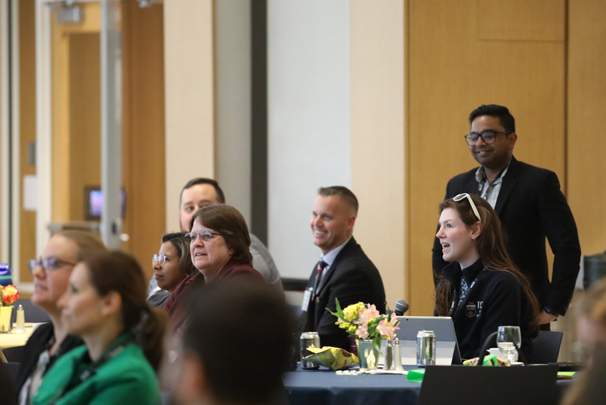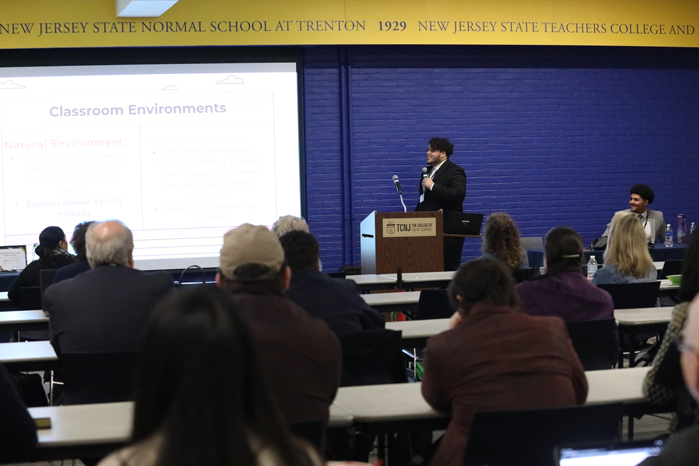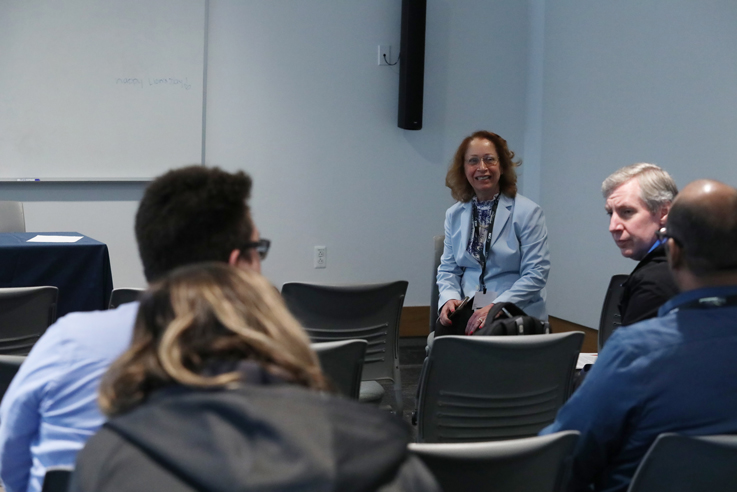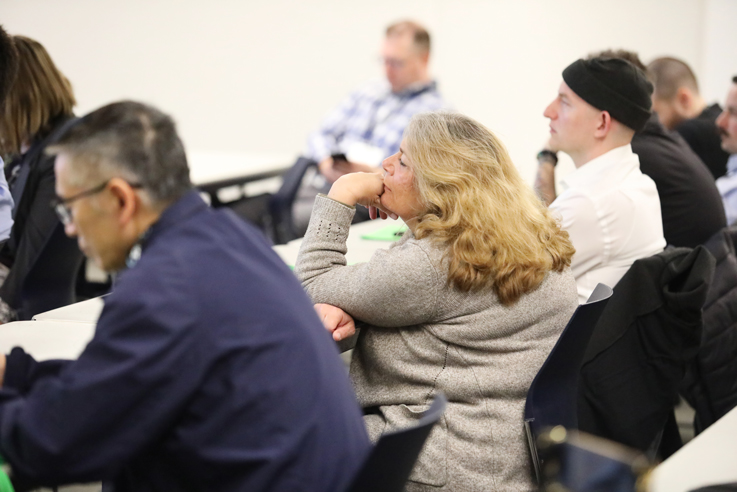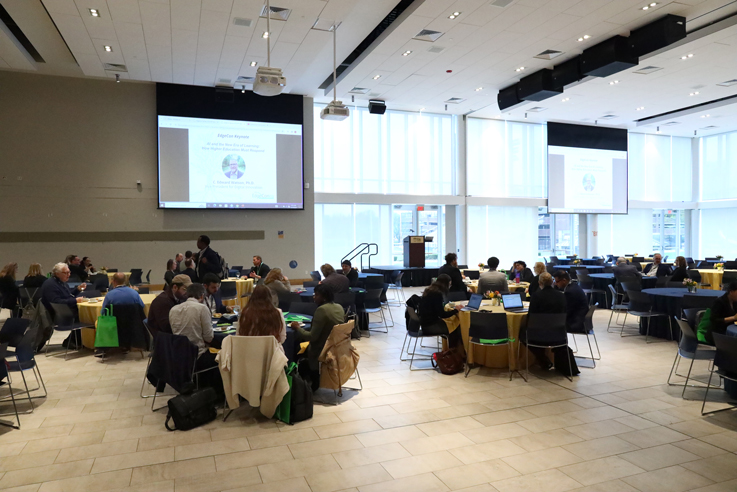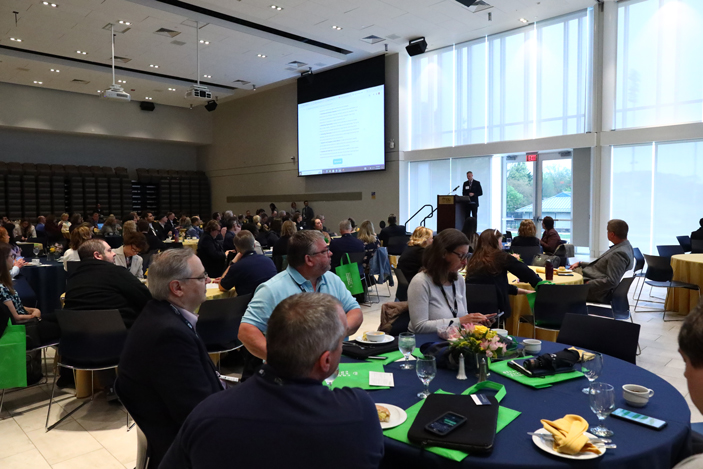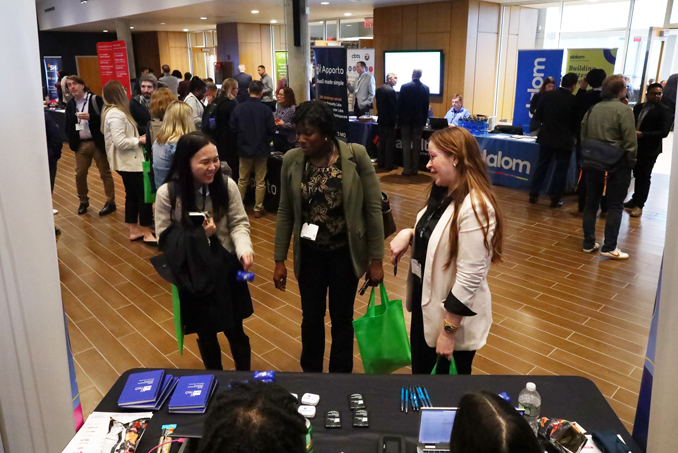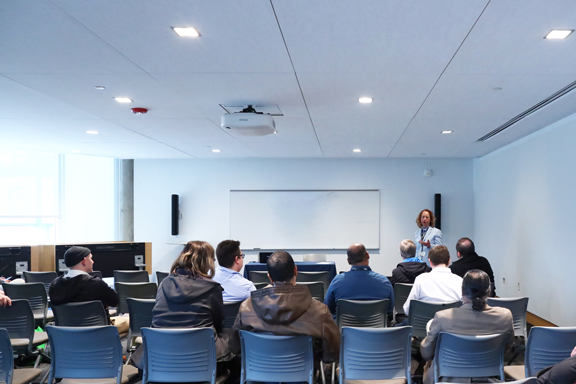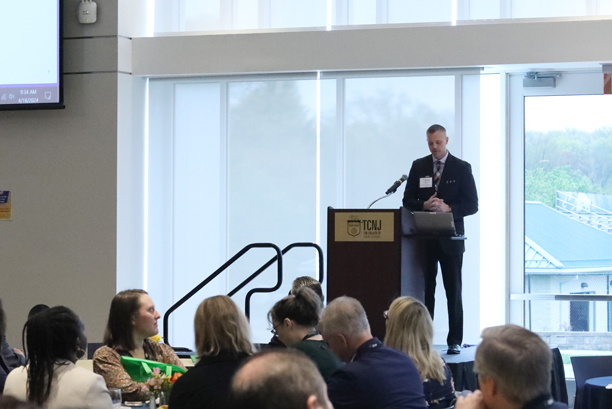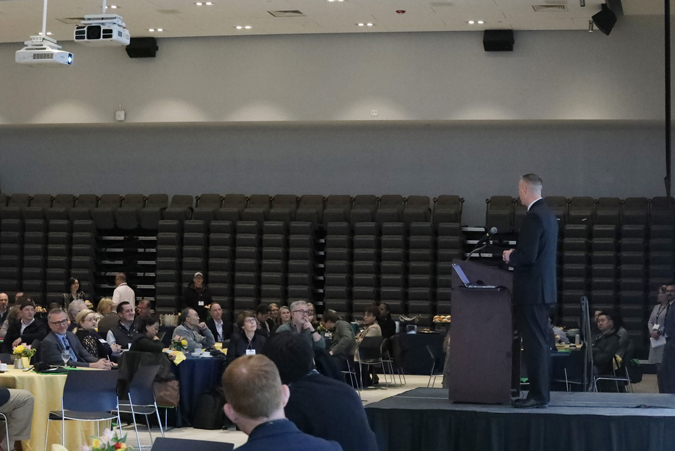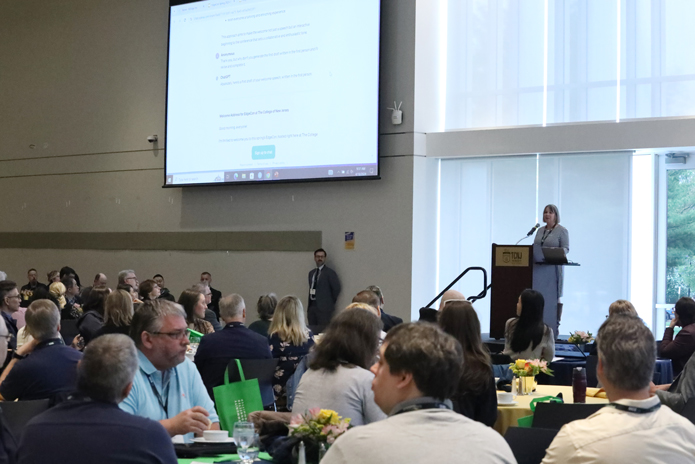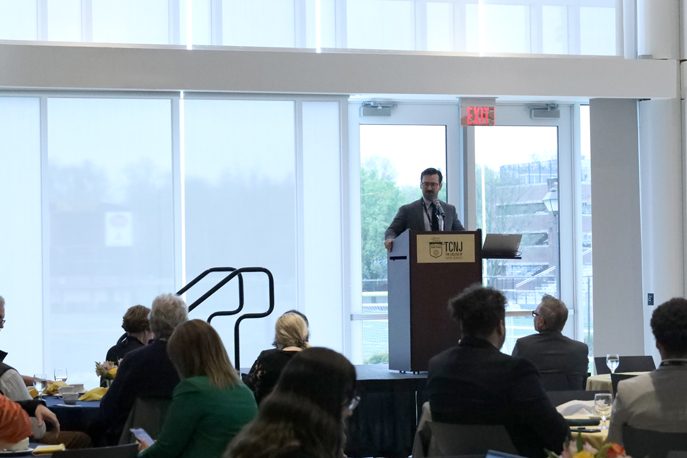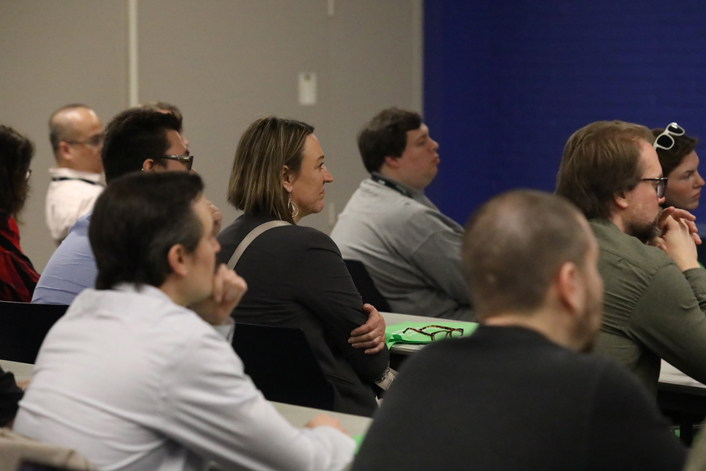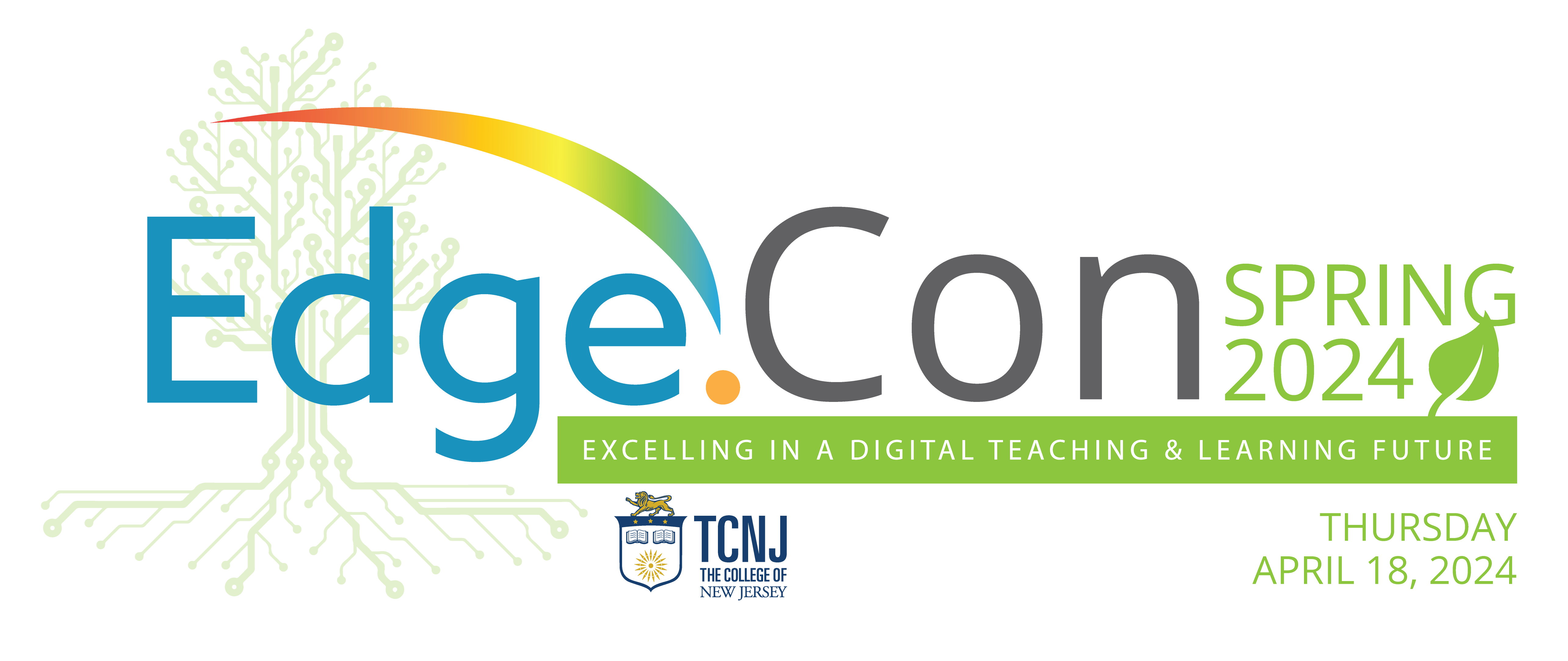
EdgeCon Spring 2024
Excelling in a Digital Teaching & Learning Future
In partnership with The College of New Jersey (TCNJ), Edge hosted EdgeCon Spring on April 18 at TCNJ’s scenic campus in Ewing Township, New Jersey. With a theme of Excelling in a Digital Teaching & Learning Future, the event was a big hit with attendees with 92% giving EdgeCon Spring “Excellent or Very Good” ratings and 100% responding “Definitely or Likely” to attend a future EdgeCon. Throughout the event, attendees had the opportunity to engage with a growing community of digital learning professionals while discovering innovative solutions to help their institutions solve today’s biggest digital learning challenges. The event also featured a keynote speaker, breakout sessions, and industry leading vendors from across the academic enterprise.
Exploring the Evolving AI Landscape
The day’s events began with an exciting session entitled, AI and the New Era of Learning: How Higher Education Must Respond. Keynote speaker, C. Edward Watson, Ph.D., Associate Vice President for Curricular and Pedagogical Innovation and Executive Director of Open Educational Resources and Digital Innovation, American Association of Colleges and Universities (AAC&U), entertained and intrigued attendees with an exploration of the evolving AI landscape and the companion challenges and opportunities that are emerging for higher education.
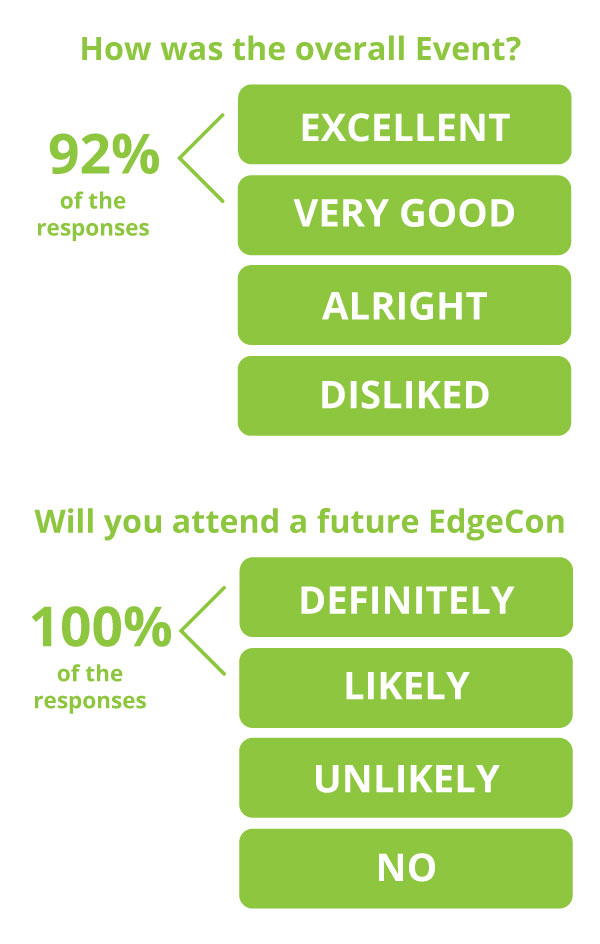

In the coming years, many graduates will likely be asked to collaborate with AI to complete on-the-job tasks in their careers. With this in mind, Watson drew from his new book, Teaching with AI: A Practical Guide to a New Era of Human Learning, to discuss concrete approaches and strategies higher education can adopt, both within the classroom and across larger curricular structures, to best prepare students for the life that awaits them after graduation.

Promoting Genuine Student Engagement
As AI becomes integrated into many aspects of our lives, there is a growing concern in higher education that students will use these tools to complete assignments. Ellen Farr, Assistant Director and Judi Cook, Executive Director of TCNJ’s Center for Excellence in Teaching and Learning, shared ways to creatively design assignments that promote genuine student engagement. Using these innovative strategies, an institution can modify their assessment approach, either using or limiting AI tool use to create captivating, challenging assignments that inspire authenticity and excitement in their students.
The Realities of Digital Learning & Instructional Design Support
Innovation in higher education is fueled by new approaches to instructional design and technology, partnered with advances in pedagogical theory and process. Unfortunately, many schools do not have the resources or budget to incorporate new digital learning strategies and cannot burden faculty and staff with additional tasks. Edge’s Joshua Gaul, Associate Vice President & Chief Digital Learning Officer, demonstrated how EdgeLearn can help lessen the burden at a non-profit price and allow institutions to advance their online programming with ease.

AI Insights from the Next Generation
This breakout session flipped the script on the normal AI discussion with a dynamic conversation with college and graduate students about their thoughts and expectations regarding AI. Moderated by Diane Rubino, Adjunct Assistant Professor, NYU, student panelists dug into AI development and application. As future leaders in this arena, they shared their concerns about the development of AI, what ethical considerations are paramount, the possibilities they’re most excited about, and how academia and industry can help students be better prepared for the AI-powered future.
Foundational Understanding of AI
For faculty members who are new to AI, this workshop provided a foundational understanding of AI’s potential when rethinking activities and assessments. Laurie Hallick, Instructional Designer, Molloy University, broke down key terms and explored innovative AI tools that can personalize instruction, boost engagement, and deepen understanding. She also addressed the challenges faced by AI usage and shared ideas on where institutions can begin to redesign online courses with practical applications of AI tools.
Organizational Ecosystems and Online Success
Alexandra Salas, President, Cognition Ink LLC, led an interactive discussion about the relationship between organizational structures and the level of quality of online education programs. During the session, attendees participated in dynamic online polling to see how this method can gather group insights and highlight key questions around an organizational ecosystem. By looking at the interplay of administrative policies, institutional culture, technology infrastructure, and student support, an institution can identify challenges and opportunities for better synergies within institutional frameworks to advance online learning.

Integrating High Performance Computing into the Undergraduate Curriculum
Many graduating students entering the modern workforce will be required to have advanced skill sets in enhanced data science and high performance computing (HPC). Sharing insights from the School of Science at TCNJ, Sunita Kramer, Dean, School of Science; Joseph Baker, Professor of Chemistry; and Shawn Sivy, HPC Systems Administrator, discussed the College’s HPC cluster that is being used for computationally driven scientific research by all departments in the School of Science.
In this presentation, they described how they successfully integrated HPC into their science curriculum and how this technology has helped equip students with the skills they will need to enter the 21st century workforce. Presenters also shared how HPC has provided faculty with a resource to engage students in transformational research experiences and hands-on learning in the classroom and the laboratory.
AI and the Future of Student Success
Attendees of this breakout session joined Stephen Walsh, Senior Director, Public & Social Impact, Slalom, and Ed Wozencroft, Chief Information Officer, VP for Digital Strategy, New Jersey Institute of Technology (NJIT), to get a closer look at how NJIT is embracing AI to support everything from campus life to curriculum planning. Presenters provided a glimpse of the future of student success enriched by AI where Walsh debuted an early-stage Digital Student Advisor.
MAGIC in Higher Education
For those who were interested in learning more about active learning experiences, this session explored a convergent parallel design, mixed-methods study called “MAGIC in Higher Education: Motivating, Active Learning, Gamifying, Imagining, and Collaborating.” This study assessed how embedding play into the architecture of a classroom can improve the learning process for students. Joining the group from Passaic County Community College, Dr. Jennifer Gasparino, Associate Professor, Human Services & Phi Theta Kappa Advisor; Andy Perales, Program Coordinator, Teachers Excellence Project & Phi Theta Kappa Co-Advisor; Alexandra Della Fera, Associate Professor, English; and John Paul Rodriguez, Assistant Professor, Computer Information Services, discussed how changing the natural passive environment of a classroom to an active, play-driven environment could influence learning outcomes.
Along with student presenters, the group shared how the research revealed that play promotes positive experiences for students focusing on active learning and significantly improved their understanding and application of a lesson’s content. Using this research and outcomes, the College created a forum to showcase the data to faculty, administration, and students; resulting in the launch of a play-based, active learning Community of Practice (CoP) for faculty professional development.
Crafting Inclusive Learning Environments
Mel Katz, Accommodations Support Specialist for Curriculum and Assessment, TCNJ, led an interactive workshop on the significance of digital accessibility in higher education and explored practical tools for implementing digital accessibility principles across physical, hybrid, and online learning environments, grounded in a universal design approach. Instead of taking a reactive approach to digital accessibility, Katz discussed how embracing a proactive universal design perspective to address digital accessibility enables instructors to prioritize the diverse needs of learners during the creation of digital content and materials.
The Educational Power of DIY Escape Rooms
During this workshop, Kate Sierra, Instructional Designer, Seton Hall University, explored the educational opportunities of integrating escape rooms into higher education classroom settings. Through collaborative problem solving, students are able to leverage each other’s strengths and expertise to achieve a common goal. Sierra showed photos of a real-life online escape room, discussed the pros and potential pitfalls of designing one, and gave participants resources, tips, and ideas for creating an escape room of their own.
Digital Accessibility in Learning Environments
In this presentation, Laura Romeo, Instructional Designer, Edge, explored the latest trends and future prospects of digital accessibility in learning environments, focusing on integrating AI, Voice User Interfaces (VUI), Augmented Reality (AR), Virtual Reality (VR), Mobile Accessibility, and Inclusive Design principles. Participants gained insights into AI-driven accessibility solutions, the benefits of VUI in digital learning platforms, leveraging AR and VR for accessible learning experiences, mobile accessibility considerations, and strategies for incorporating inclusive design.
Contextualizing Multimedia for Knowledge Transfer
Technological advancements have made multimedia a main language for conveying information and knowledge. Cecily McKeown, Instructional Multimedia Specialist, Hudson County Community College, led a discussion on how multimedia learning environments tailored to the context can allow students to integrate and interpret relationships. With a goal of promoting learner-centered teaching, this theory can help students actively build new knowledge by experiencing and integrating new information with their prior knowledge. McKeown explored the concept of visual thinking by delving into the cognitive psychology behind media-based instructions and their role in humanizing digital learning and fostering stronger teacher-student relationships.
Keeping Up with GenAI at Montclair State University
In January 2023, the instructional design team at Montclair State University began ideating a response to the advances in artificial intelligence, which broke headlines in late 2022. Since then, Instructional Technology and Design Services (ITDS) has produced a suite of web-based resources, workshops and training, and consultations to guide University faculty through discovery and exploration of GenAI to be leveraged pedagogically and mitigate misuse. Instructional Designers from Montclair State University, Joseph Yankus and Gina Policastro, shared their experience composing these resources, facilitating small and large-group faculty development, the lessons learned, and the goals for the upcoming year.
Tips for Accessible Digital Media
From presentation slide decks and word-processed documents to PDFs and videos, these resources can be important tools for student learning. Ann Oro, Senior Instructional Designer, Seton Hall University, shared ten easy tips for improving the user experience of a course’s digital documents and discussed the importance of headings, alternative text for images, tables, accessibility checkers, lists, font selection and color, slide titles, saving files as PDFs, reading order, and captioning.
Implementing Dual Rubrics
Simple Rubrics support learning by offering a checklist of expectations, a mechanism for delivering formative/summative evaluation, and a framework for learner reflection and self-remediation. Dual Rubrics go further to also support teaching by offering a means for making an inference about students’ mastery of learning outcomes/competencies. Karen Harris, Senior Instructional Designer and Assessment Specialist, Rutgers University, explored how implementing Dual Rubrics in the Canvas LMS, at the course or program level, can offer a data-driven opportunity to incorporate learning insights that support quality improvement in instructional effectiveness and curricular design.
Agenda
8 a.m.-8:30 a.m.—Check-In & Networking
8:30 a.m.-9:30 a.m.—Breakfast, Networking, & Exhibitor Connections
9:35 a.m.-10:35 a.m.—General Session: AI and the New Era of Learning: How Higher Education Must Respond
10:45 a.m.-11:25 a.m.—Breakout Sessions
11:35 a.m.-12:15 p.m.—Breakout Sessions
12:15 p.m.-1:20 p.m.—Lunch, Networking, & Exhibitor Connections
1:30 p.m.-2:10 p.m.—Breakout Sessions
2:20 p.m.-3:00 p.m.—Breakout Sessions
3:10 p.m.-3:50 p.m.—Breakout Sessions
3:50 p.m.-5:00 p.m.—Snacks/Coffee, Networking, & Exhibitor Connections

C. Edward Watson, Ph.D.
Associate Vice President for Curricular and Pedagogical Innovation and
Executive Director of Open Educational Resources andDigital Innovation,
American Association of Colleges and Universities (AAC&U)
Announcing EdgeCon Spring 2024 Keynote Speaker
Generative AI tools, such as ChatGPT, Claude, Gemini, and others, have had an astonishing impact on the ways we learn, work, and think over the past year. Initially, the concern for many in higher education was how students might use these tools to complete assignments; however, a much more complex and daunting challenge has emerged. A 2023 Goldman Sachs report analyzed tasks versus jobs and concluded that two-thirds of current occupations could be partially automated by AI. This doesn’t mean that two-thirds of jobs will be replaced by AI, though some positions will indeed be lost to the new technology; rather, most of our graduates will soon be asked to collaborate with AI to complete significant portions of their work each week.
Drawing from the presenter’s new book, Teaching with AI: A Practical Guide to a New Era of Human Learning (Johns Hopkins University Press), this keynote will explore the evolving AI landscape and detail the companion challenges and opportunities that are emerging for higher education. While academic integrity and AI detection will be discussed, the core focus of this keynote will be on concrete approaches and strategies higher education can adopt, both within the classroom and across larger curricular structures, to best prepare students for the life that awaits them after graduation.
At AAC&U, he leads national and state-level advocacy and policy efforts to advance quality in undergraduate student. Before joining AAC&U, Dr. Watson was the Director of the Center for Teaching and Learning at the University of Georgia (UGA). At UGA, he led university efforts associated with faculty development, TA development, student learning outcomes assessment, learning technologies, and media production services.
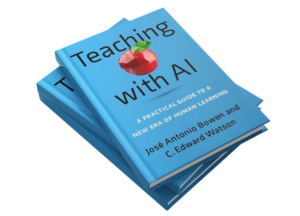
He has published on teaching and learning in a number of journals, including Change, Diversity & Democracy, Educational Technology, EDUCAUSE Review,International Review of Research in Open and Distributed Learning, Journal for Effective Teaching, Liberal Education, Peer Review, and To Improve the Academy, and has recently been quoted in the New York Times, Chronicle of Higher Education, Campus Technology, EdSurge, Consumer Reports, UK Financial Times, and University Business Magazine and by the AP, CNN and NPR regarding current teaching and learning issues and trends in higher education. His most recent book is the forthcoming Teaching with AI: A Practical Guide to a New Era of Human Learning (Johns Hopkins University Press).
Exhibitor Sponsors

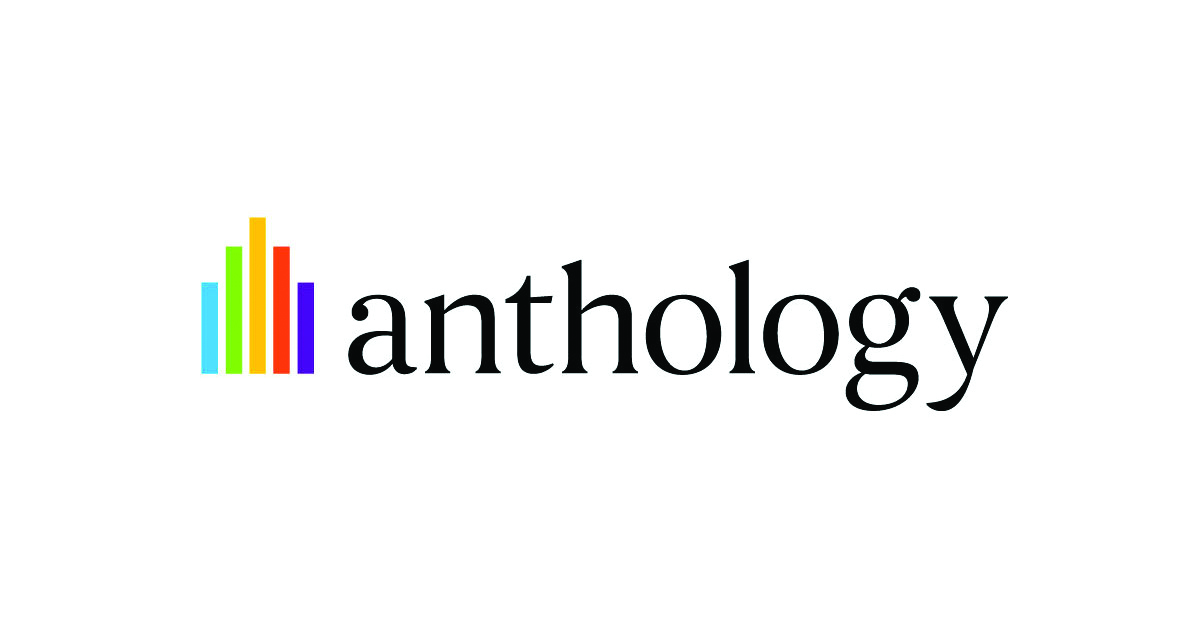
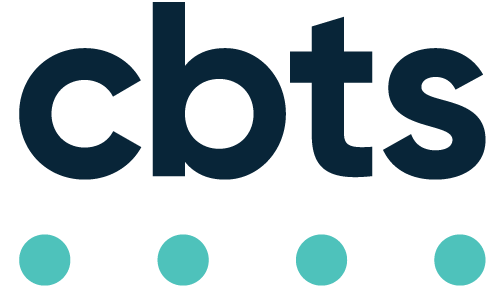

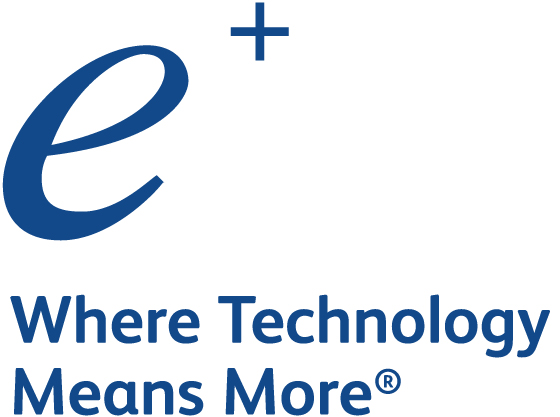
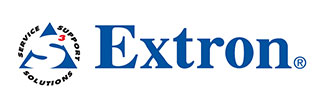




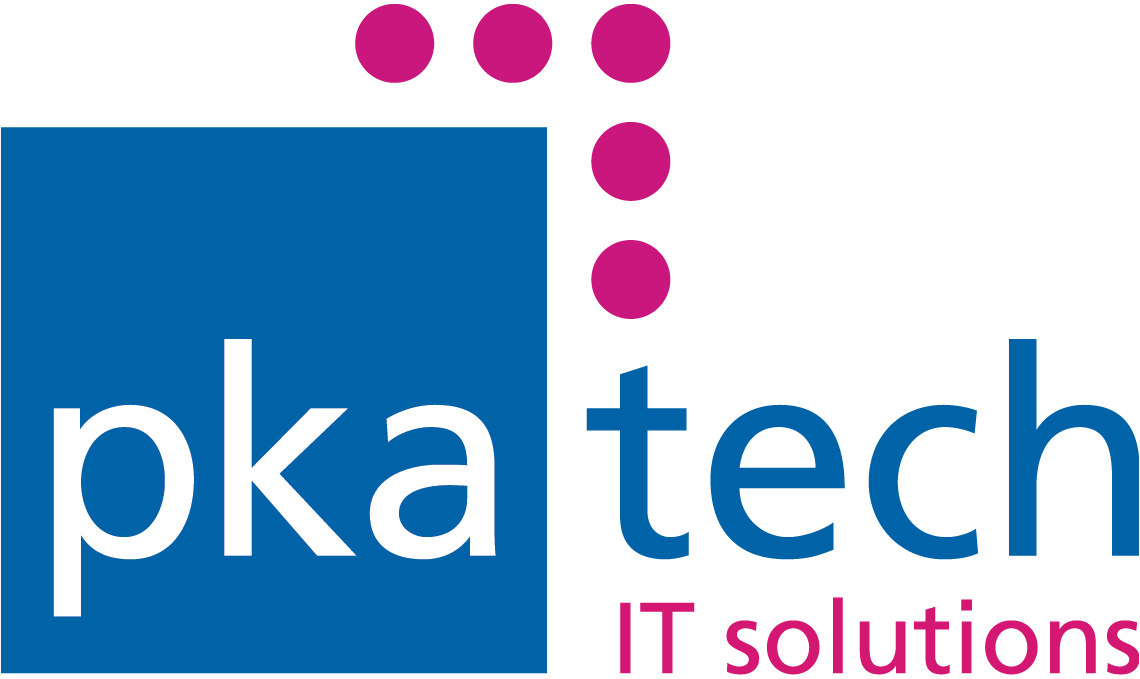




Lanyard Sponsor
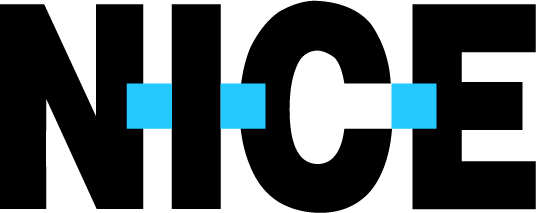
VIP Reception Sponsor



